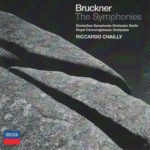 This morning’s conductor of Anton Bruckner’s Symphony No. 2 in C Minor (WAB 102) is Italian-born Riccardo Chailly (1953-).
This morning’s conductor of Anton Bruckner’s Symphony No. 2 in C Minor (WAB 102) is Italian-born Riccardo Chailly (1953-).
I first encountered Chailly on October 4, 2016 and I offered some information from his entry on Wikipedia. However, I don’t recall reading this when I skimmed his Wiki page last time:
Chailly has an exclusive recording contract with Decca, and his recordings with Decca include complete cycles of the symphonies of Johannes Brahms, Gustav Mahler and Anton Bruckner. His Brahms cycle with the Gewandhausorchester won the 2014 Gramophone Award for Recording of the Year. Other notable achievements include recordings of Igor Stravinsky, Edgard Varèse and Paul Hindemith. More recently, with the Gewandhaus Orchestra, Chailly has led recordings of Felix Mendelssohn, Johann Sebastian Bach, Brahms, Robert Schumann’s symphonies in the re-orchestrations by Mahler, and a complete cycle of Beethoven’s symphonies. His past recordings with American orchestras included Shostakovich: The Dance Album with the Philadelphia Orchestra[20] and Stravinsky’s Le Sacre du printemps with the Cleveland Orchestra.
Chailly has been married twice. He has a daughter, Luana, by his first marriage to Anahi Carfi, and a stepson from his second and current marriage to Gabriella Terragni.
 An exclusive with Decca, huh? That’s cool. Decca is a record label with a long and prestigious history. Worthy.
An exclusive with Decca, huh? That’s cool. Decca is a record label with a long and prestigious history. Worthy.
First up, the objective aspects of this recording:
Bruckner’s Second Symphony
Riccardo Chailly conducts
The Royal Concertgetbouw Orchestra plays
Robert Haas supplied the edition (but from what year, which revision?)
The symphony clocks in at 67.29
This was recorded in 1991
Chailly was 38 when he conducted it
Bruckner was 48 when he composed it
Bruckner wrote his symphonies in four parts. The time breakdown of this one (Symphony No. 2 in C Minor, Haas version), from this particular conductor (Chailly) and this particular orchestra (Royal Concertgebouw Orchestra) is as follows:
Allegro……………19:39
Adagio……………18:13
Scherzo…………..9:42
Finale……………..19:39
There’s a :16 second discrepancy between the time of each movement as indicated on the CD sleeve, and the timing of each movement as listed in iTunes. The times on the CD booklet are shorter. I doubt :16 is a big deal. But it is something I noticed.
By way of comparison between Chailly’s interpretation this morning, and Barenboim’s yesterday, here are the timings for Barenboim (1877 version, Chicago Symphony Orchestra):
Allegro……………19:13
Adagio……………17:10
Scherzo………….10:21
Finale……………..19:33
As you can see, not much difference. Barenboim’s interpretation is a little over one minute shorter.
From the insightful liner notes by Andrew Huth:
The Second Symphony followed in 1871-72. In these works we can hear Bruckner expanding his musical horizons and infusing traditional symphonic forms with a new spaciousness and sense of grandeur. The symphonic techniques take Beethoven as their starting point; there is frequent reference to the older church styles, particularly in the slow movements, but the orchestral richness and breadth is unmistakably Wagnerian.
Okay. Now for the subjective aspects to this morning’s listening:
My Rating:
Recording quality: 4
Overall musicianship: 5
CD liner notes: 3 (short, informative essay in three languages – English, German, French – but lacking information about which version Chailly used. Linz? Vienna? What year?)
How does this make me feel: 4
Wow. What a difference it makes to hear a different symphony, recorded at a different time and place!
The first time I heard Chailly I was not impressed. The performance was Symphony No. 1 in C Minor, recorded in 1987 in Berlin. This Symphony (No. 2), recorded four years later in Amsterdam, is spectacular. Night and day difference – and that despite the symphony’s length and lack of catchy melodies and dynamics…although I must say Chailly’s Finale is quite grand. Lots of power there. Like a Bond martini, I was stirred.
Yesterday, I was surprised by a lack of inspiration from Barenboim. This morning, I’m surprised by the presence of inspiration from Chailly.
All of this goes to prove that Classical music – like all great art – is in the ears and eyes of the beholder.
Also, I wonder how much one’s frame of mind, location, physical comfort, et al, play into the experience. I do remember not being particularly happy or physically comfortable yesterday morning. Did that affect how I perceived Barenboim’s performance? Possibly. Or maybe there’s an intangible magic to Classical recordings, something about each performance that resonates with certain listeners.
